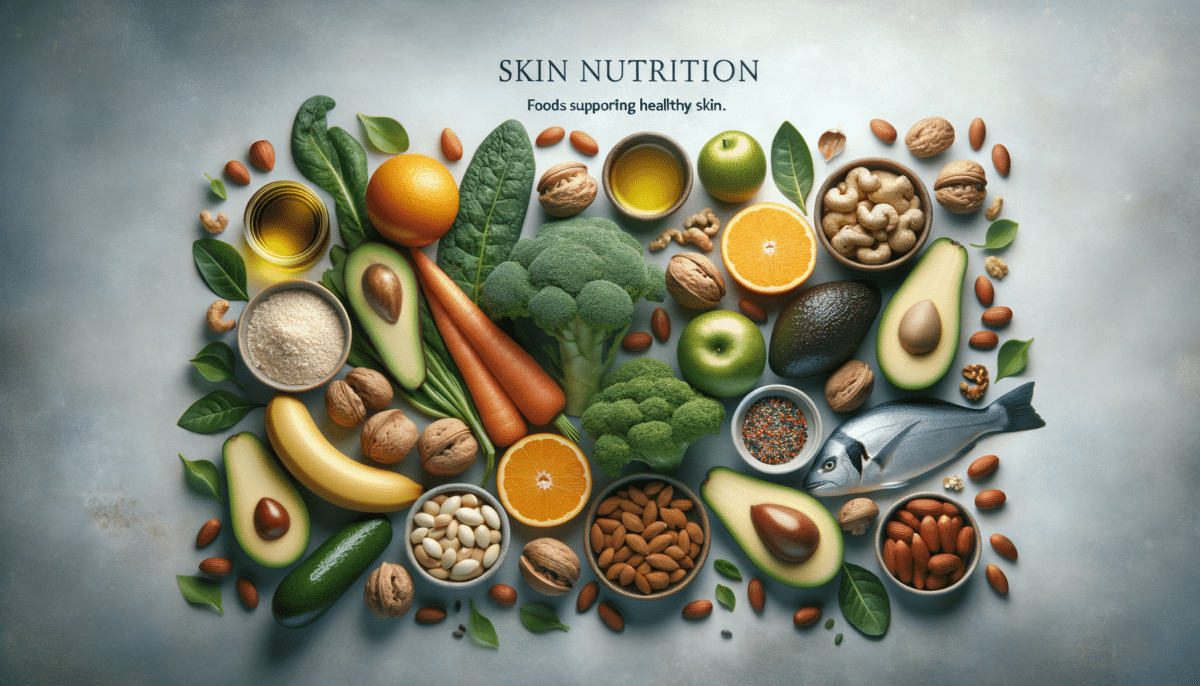Understanding Skin Nutrition
Our skin is not just the largest organ of our body; it is also a reflection of our overall health. The nutrients we consume play a significant role in maintaining skin’s health and vitality. Skin nutrition is an area of growing interest, as more people recognize the connection between diet and skin condition. A balanced diet rich in specific vitamins and minerals can help the skin repair itself, stay hydrated, and maintain its elasticity. This understanding is crucial as it empowers individuals to make informed dietary choices that support their skin’s needs.
Skin nutrition primarily focuses on vitamins such as A, C, D, and E, as well as minerals like zinc and selenium. These nutrients contribute to skin health by promoting collagen production, reducing inflammation, and protecting against environmental damage. For instance, Vitamin C is renowned for its role in collagen synthesis, while Vitamin E acts as a powerful antioxidant. Furthermore, omega-3 fatty acids found in fish oils are known to keep the skin supple and moisturized.
By incorporating a variety of nutrient-rich foods into our diet, we can support the skin’s natural functions and potentially prevent common issues such as dryness, acne, and premature aging. Thus, understanding skin nutrition is not just about aesthetics; it’s about nurturing our body’s first line of defense against the external world.
The Role of Antioxidants in Skin Health
Antioxidants are crucial for skin health due to their ability to combat oxidative stress, which is caused by free radicals. Free radicals are unstable molecules that can damage cells, leading to premature aging and skin diseases. Antioxidants neutralize these free radicals, thereby protecting the skin from damage.
Foods rich in antioxidants include berries, dark chocolate, and leafy greens. Berries, such as blueberries and strawberries, are particularly high in antioxidants like flavonoids and polyphenols. These compounds help in reducing inflammation and promoting skin repair. Dark chocolate, with its high cocoa content, is another antioxidant-rich food that can improve skin texture and hydration.
Incorporating antioxidant-rich foods into your diet can enhance your skin’s resilience to environmental stressors and improve its overall appearance. By prioritizing these foods, you can support your skin’s health from the inside out, making antioxidants a vital component of any skin nutrition plan.
Hydration and Skin Elasticity
Hydration is a key factor in maintaining skin elasticity and preventing dryness. The skin’s ability to retain moisture is essential for its suppleness and resilience. When the skin is well-hydrated, it appears plumper and more youthful.
Water is the most obvious source of hydration, but certain foods can also contribute to maintaining skin moisture. Foods with high water content, such as cucumbers, watermelon, and oranges, are excellent for keeping the skin hydrated. Additionally, foods rich in omega-3 fatty acids, like salmon and walnuts, help maintain the skin’s lipid barrier, which is crucial for retaining moisture.
By ensuring adequate hydration through both fluid intake and a diet rich in water-dense foods, you can support your skin’s natural elasticity and prevent signs of aging. This holistic approach to hydration is a cornerstone of effective skin nutrition.
Vitamins and Minerals: Building Blocks of Healthy Skin
Vitamins and minerals are the building blocks of healthy skin, each playing a unique role in skin maintenance and repair. Vitamin A, for instance, is essential for cell production and repair, making it vital for skin renewal. Foods rich in Vitamin A include carrots, sweet potatoes, and leafy greens.
Vitamin C is another powerhouse for skin health, known for its role in collagen synthesis and protection against UV damage. Citrus fruits, strawberries, and bell peppers are excellent sources of Vitamin C. Meanwhile, Vitamin D, which can be synthesized from sunlight exposure, is crucial for skin cell growth and repair.
Minerals like zinc and selenium are equally important. Zinc supports skin healing and inflammation reduction, found in foods like nuts and seeds. Selenium, present in Brazil nuts and eggs, offers protection against sun damage. By incorporating a variety of these vitamins and minerals into your diet, you can ensure your skin receives the nutrients it needs to thrive.
Conclusion: Nourishing Your Skin from Within
In the journey to achieving healthy, glowing skin, nutrition plays an indispensable role. By understanding the vital nutrients that support skin health, individuals can make informed choices that benefit their complexion. From antioxidants that fight free radicals to vitamins and minerals that support skin structure, the foods we eat directly influence our skin’s appearance and function.
Embracing a diet rich in diverse, nutrient-dense foods not only enhances skin health but also contributes to overall well-being. As we continue to explore the connection between diet and skin, it becomes clear that nourishing your skin from within is a sustainable and effective approach to maintaining a vibrant complexion.
